Tsinghua-Caixin Public Governance Forum IIIRelease time: 2020-10-08
Spotlight| Economic Recovery and Sustainable Industrial Development under China’s New “DualCirculation” Development Pattern –
“The 3rd Tsinghua - Caixin Forum on Public Governance” was held in Beijing
Jointly organized by the Center for Industrial Development and Environmental Governance (CIDEG) of Tsinghua University, the Institute of State Governance and Global Governance of Tsinghua University, and Caixin Media, “the 3rd Tsinghua - Caixin Forum on Public Governance” was held in Wenjin Hotel Beijing on September 12. The forum based on a new economic development pattern of “dual circulation”, proposed by Chinese President Xi Jinping, that takes domestic development as the mainstay, with domestic and international development reinforcing each other. It mainly discussed how to promote the benign development between domestic and international circulation and to realize the sustainable industrial development.
The forum comprised of two sessions themed on the “Dual Circulation” and Economic Recovery, the “Dual Circulation” and Sustainable Industrial Development, respectively. Chaired by Chen Ling, Associate Professor of School of Public Policy and Management of Tsinghua University, Director of CIDEG, many distinguished guests were invited to attend the forum, including Li Daokui, a member of the 13th National Committee of the Chinese People's Political Consultative Conference (CPPCC), Director of the Center for China in the World Economy, Director of the Academic Center for Chinese Economic Practice and Thinking (ACCEPT) of Tsinghua University; Lawrence Lau, Ralph and Claire Landau Professor of Economics of the Chinese University of Hong Kong; Liu Shouying, Dean & Secretary of Party Committee of the School of Economics of Renmin University of China; Zhang Ming, Director of Department of International Investment of the Institute of World Economics and Politics of Chinese Academy of Social Sciences; Liu Peilin, Research Fellow of Development Research Center of the State Council; Xue Lan, Co-Chairman of Academic Committee of CIDEG, Dong Yu, Executive Deputy Director of China Institute for Development Planning at Tsinghua University, An Xiaopeng, Deputy Director of AliResearch, Gu Qiang, Senior Vice President of China Fortune Land Development Co., Ltd.
On behalf of CIDEG, one of the organizers in the forum, Prof. Xue Lan gave a welcoming speech and welcomed all the guests to attend the forum. He expected to hear different perspectives on how to promote the benign development between domestic and international circulation and the sustainable industrial development in the forum.
Yang Zheyu, Editorial Editor of Caixin Media and Editor-in-Chief of “China Reform” delivered a speech. He mentioned that the new development pattern of “Dual Circulation” that carries on the Party’s idea of “Two Resources and Two Markets” is an essential strategy proposed in the global context of trade war, the U.S. election and the pandemic outbreak. People are now concerning about whether the domestic circulation will move China towards a status of “closed-door”, and how to improve the efficiency of the domestic circulation and expand its scale. Thus, finding the answers for these key issues are of the great significance in this forum.
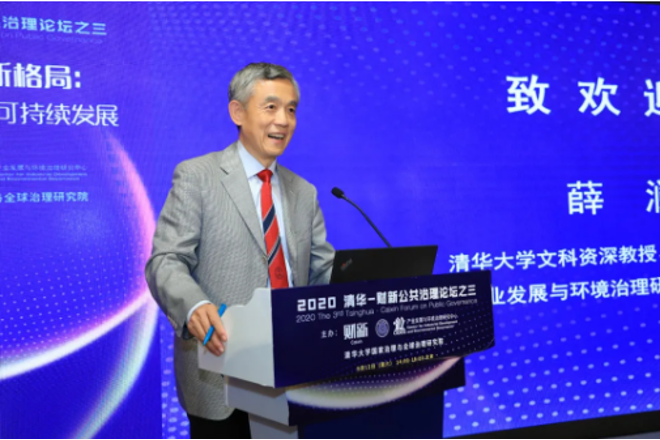
Xue Lan, Professor of the School of Public Policy and Management of Tsinghua University, Dean of Schwarzman College of Tsinghua University,
Co-Chairman of the Academic Committee of CIDEG gave a welcoming address.
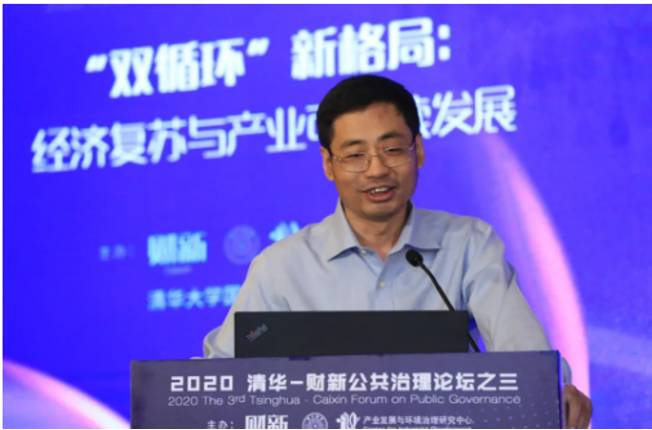
Yang Zheyu, Editorial Editor of Caixin Media and Editor-in-Chief of “China Reform” delivered a keynote speech.
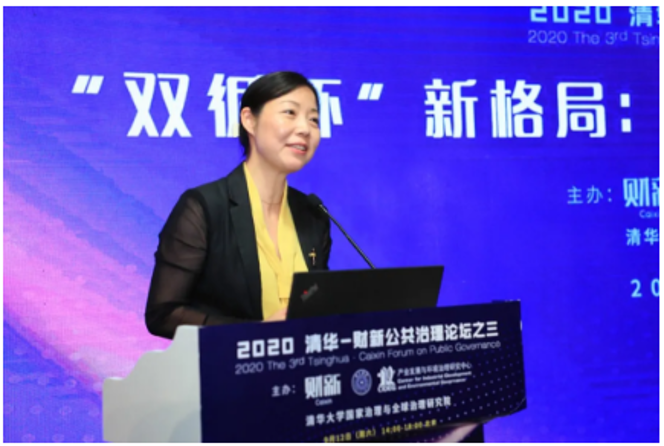
Chen Ling, Associate Professor of School of Public Policy and Management of Tsinghua University, Director of CIDEG chaired the forum.
Session One: A New Development Pattern of Dual Circulation and Economic Recovery
1、Li Dao Kui: Middle Income Doubling Plan- Strategic Action for Dual Circulation
Prof. Li Daokui delivered a speech on Middle Income Doubling Plan- Strategic Action for Dual Circulation. He stated that China is currently at a stage where it must rely on its large domestic market for long-term development. To expand the domestic market, we must tap the potential market demand, and fully use the capital flow to form the domestic circulation as the mainstay, and carry out scientific and technological innovation. Prof. Li proposed the strategy of “10+4” to exploit the domestic market demand. The strategy aims to boost up the consumption towards the existing 400 million middle-income population, meanwhile to bring the 400 million out of 1 billion non middle-income population up to the middle-income level for the next 15 years, through the national strategies of urbanization, tax reduction and coordinated development of regions.
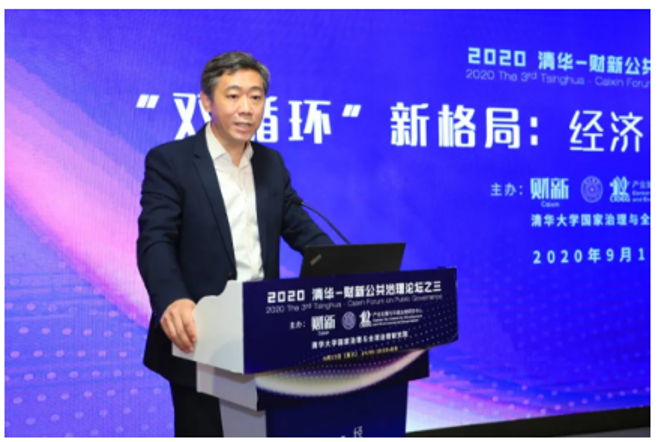
Keynote speech by Li Daokui, a member of the 13th National Committee of the Chinese People's Political Consultative Conference (CPPCC), Director of the Center for China in the World Economy,
Director of the Academic Center for Chinese Economic Practice and Thinking (ACCEPT) of Tsinghua University.
2. Lawrence Lau: On Twin Circulation
Prof. Lawrence Lau delivered a keynote speech on “On Twin Circulation” online. He explained the twin/dual circulation as domestic circulation and international circulation, and the circulation means that the demand and supply can meet each other inside the circle. Under global context of the Sino-US trade friction and the Covid-19 pandemic, Prof. Lau believes that complete isolation and self-sufficiency are now within reach for China, but it will cause a significant decline in living standard throughout the country. China has benefited tremendously from economic globalization, it is not appropriate to go back to any “single circulation”, but should adhere to the “twin/dual circulation”. It is possible for China to decouple from the US economy, but China must strengthen its ties with the rest of the world. To achieve sustainable economic development, we need to find out an alternative source of supply to avoid the supply chain disruptions, meanwhile to promote resource diversification and recycling, strengthen indigenous innovation, support infant industries, and increase household consumption by wage adjustment mechanisms, as well as expand public consumption.
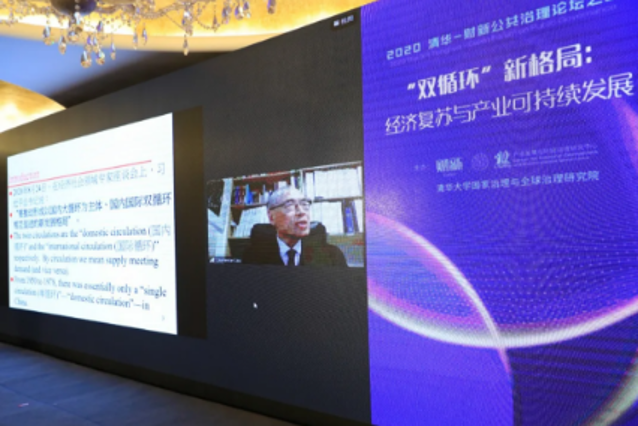
Keynote speech by Lawrence Lau, Ralph and Claire Landau Professor of Economics of the Chinese University of Hong Kong.
3. Liu Shouying: The Impact of the Covid-19 Pandemic on the Complexity of Chinese Products
Prof. Liu Shouying delivered a keynote speech on the Impact of the Covid-19 Pandemic on the Complexity of Chinese Products. He stressed that the more complex a country's products are, the stronger it becomes in economic competition. The number of products with comparative advantage has been increasing with China's participation in international circulation, which in return increase the product complexity. The impact of Covid-19 pandemic has generally caused a significant decline in exports of products with comparative advantage, but has a smaller impact on advanced products such as integrated circuits, the impact on import and export of products in different regions is also different. Prof. Liu believes that international circulation can improve the position of China's comparative advantage products in global product space. Besides, the upgrading of China's manufacture requires further improvement of product complexity and connectivity, as well as an objective assessment on the impact of international politics towards the industrial chain.
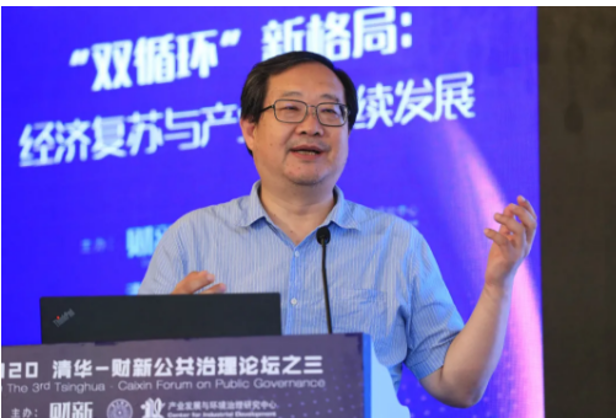
Keynote speech by Liu Shouying, Dean & Secretary of Party Committee of the School of Economics of Renmin University of China.
4. Zhang Ming: How to Systematically Establish a New Development Pattern of “Dual Circulation”
Zhang Ming gave a speech on How to Systematically Establish a New Development Pattern of “Dual Circulation”. He stressed that the "Dual Circulation" is a continuation of the development concept of the "Great Circulation". It is a forced choice we have to make to deal with the external contradictions, but also a necessary choice for domestic economic development and upgrading. To establish a new development pattern of "Dual Circulation", it is necessary to carry out reform with domestic circulation as the mainstay, boost consumption expansion, realize industrial structure upgrading and technological innovation, and promote free factor mobility and regional integration. Meanwhile we need to achieve the mutual promotion of domestic and international circulation from the four aspects of trade, finance, opening up and mechanism, provide higher quality consumption on supply, strengthen incentives for independent technological innovation domestically, and promote new regional integration. Moreover, we also need to ensure China's key role in international industrial chain, and enhance the interaction of domestic and international circulation by trade and finance.
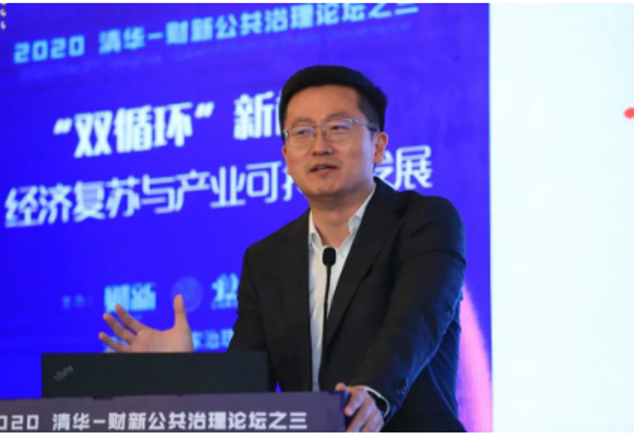
Keynote speech by Zhang Ming, Director of Department of International Investment of the Institute of World Economics and Politics of Chinese Academy of Social Sciences.
5. Liu Peilin: Seeking a New Way Out for Domestic and International Circulation
Mr. Liu Peilin gave a speech on Seeking a New Way Out for Domestic and International Circulation. He emphasized that the most striking challenge for China is not simple a shock to demand, but rather the risk of supply-chain disruption caused by the sudden and possibly long-term restrictions on high-tech exports from developed countries. Thus, continuous supply chain must be ensured to maintain mutual development and interaction between domestic and international circulation. To this end, China should push forward the establishment of international economic governance to create a balanced technology and industrial security pattern. Such security pattern may require China to build up the concept on a balanced technology and industrial security, and to make credible commitments not to pursue a leading role in all technologies and industrial field, so as to alleviate the risk of supply chain disruption in China currently. Within the security pattern, Mr.Liu proposed the strategies of “four zero” and “reciprocity”, which adopts “zero tariff, zero non-tariff barriers, zero subsidies and zero export restrictions” to reshape the rules of international economic and trade exchanges, and ease Sino-US economic and trade relations. However, to turn all these assumptions into reality require sound coordination and collaboration between different sectors in China.
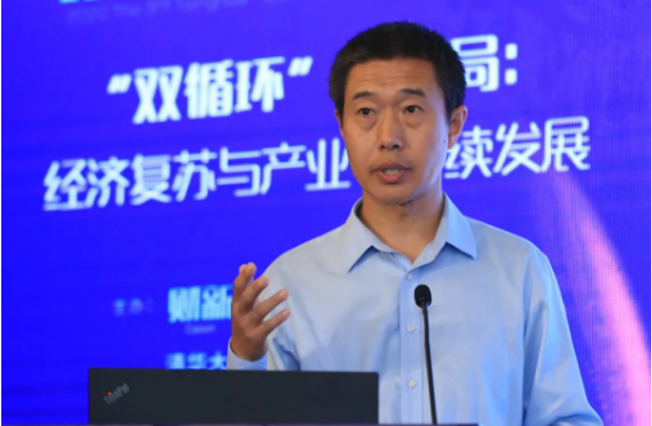
Keynote speech by Liu Peilin, Research Fellow of Development Research Center of the State Council.
Panel Discussion in Session One
In this Session, audiences raised up questions in terms of the overinvestment in energy, the new changes brought by AI to the industrial chain, and the tax reduction for low-income groups, etc. Li Daokui, Liu Zunyi, Zhang Ming, Liu Shouying and Liu Peilin shared their insights on the advantages and disadvantages of China in the AI era, and the solutions to economic opportunities and basic rights of middle-income groups.
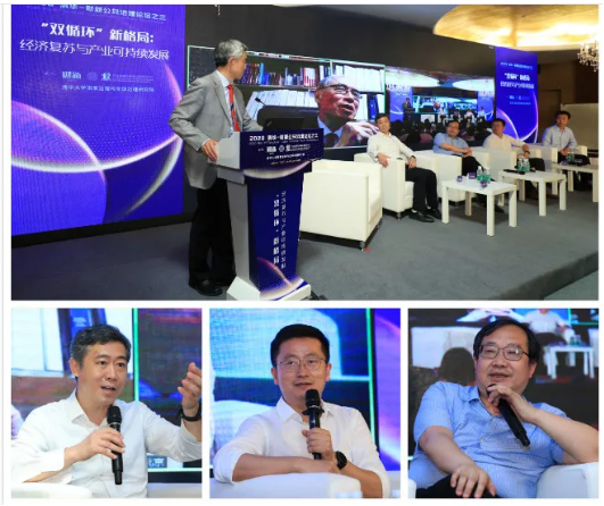
Panel Discussion in Session One
Session Two: “Dual Circulation” and Sustainable Industrial Development.
1.Xue Lan: New Economic Governance and the New Development Pattern of Dual Circulation
Prof. Xue Lan delivered a keynote speech on New Economic Governance and the New Development Pattern of “Dual Circulation”. He clarified that two major backgrounds under the "Dual Circulation" are the challenges of the international environment and the new economic development opportunities caused by Covid-19 pandemic. The demand on the large market and the broad scenario in the new economy may invigorate the “Dual Circulation”; at the same time, the new economy is also facing the risks from the development of emerging applications, global market rules and barriers, collisions with the traditional economy, and the breakthroughs in classical theories, etc. Thus, Prof. Xue stressed that the new economy cannot be absent from the new governance.
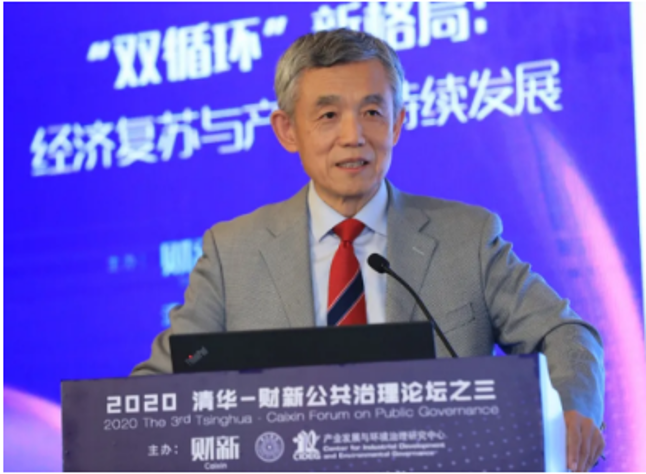
Keynote speech by Xue Lan, Professor of the School of Public Policy and Management of Tsinghua University, Dean of Schwarzman College of Tsinghua University,
Co-Chairman of the Academic Committee of CIDEG.
2. Dong Yu: Seize the Key to Dual Circulation, Rebuild the Industrial Basic Capacity
Dong Yu gave a keynote speech on Seize the Key to Dual Circulation, Rebuild the Industrial Basic Capacity. He proposed that we should pursue a high-quality circulation, so it is necessary to propose a new version of the supply-side structural reform that aims at achieving a higher level of dynamic balance of demand-driven supply and supply-creating demand. He believed that upgrading the supply system depends on manufacture. However, China's manufacture is facing many challenges due to the pandemic outbreak, and these challenges can be addressed by taking the "industrial base reengineering project" as the breakthrough point to redefine “the industrial basic capabilities”, and further to refine the "goals for building manufacturing power". Meanwhile, measures such as establishing a laboratory system, building advanced manufacturing cluster in leading cities, paying high attention to standards and adhering to safety in opening-up can be adopted to push forward the transformation of industrial policies.
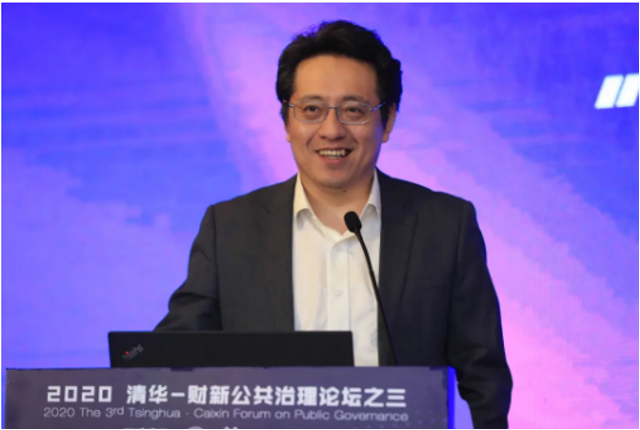
Keynote speech by Dong Yu, Executive Deputy Director of China Institute for Development Planning at Tsinghua University.
3. An Xiaopeng: Releasing Digital Dividend is the Acting Point to Create a “Dual Circulation”.
An Xiaopeng gave a keynote speech on Releasing Digital Dividend is the Acting Point to Create a “Dual Circulation”. He mentioned that data is forming a new kind of productivity. New technologies such as data and AI have brought about transformation in the productivity system, and China has the superimposed advantages on its enormous internet consumers and manufacture during this transformation. The “Dual Circulation” strategy needs to take full advantage of the domestic super-large-scale market. With the rise of consumer sovereignty in the super-large-scale market and the increase of market instability, companies should establish a high-frequency competition system to respond to the changes from the outside world, thereby developing their own competitive advantage. He stressed that the contradiction of digital transformation is the contradiction between the demand of enterprise global optimization and fragmented supply. To tackle this issue, it is necessary to establish an industrial internet to promote a better connection between enterprises and suppliers, and to build a whole-industrial chain and total-factor resource optimization system.
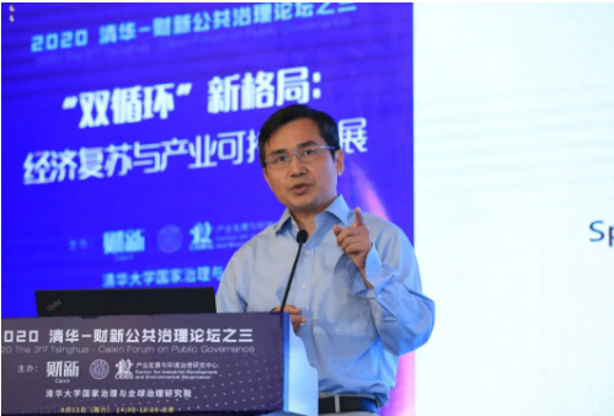
Keynote speech by An Xiaopeng, Deputy Director of AliResearch.
4. Gu Qiang: Industrial Space Governance under the New Development Pattern of Dual Circulation
Gu Qiang delivered a keynote speech on Industrial Space Governance under the New Development Pattern. He stressed that many industries in China have weaknesses caused by the shortcomings of higher education. To solve this problem requires the improvement of higher education. He pointed out that the localization, clustering and rooting of domestic industries determine the competitiveness of the industry. Moreover, there is a trend of re-urbanization of innovation globally. Under the new pattern, industrial space governance needs to deal with four relationships of "space management and market selection", "industrial policy and market mechanism", "government regulation and non-policy system", and "supply chain coordination and value chain distribution".
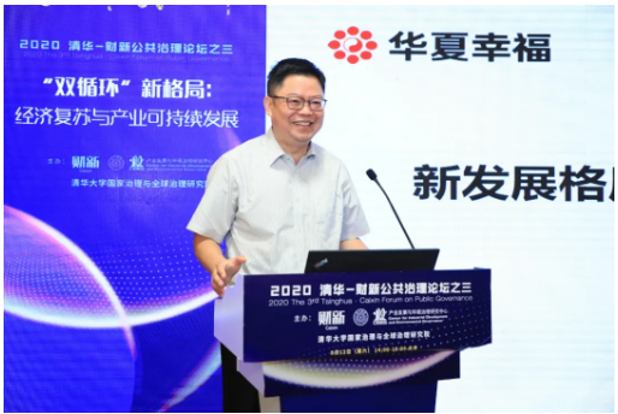
Keynote speech by Gu Qiang, Senior Vice President of China Fortune Land Development Co., Ltd.
Panel Discussion in Session Two
At last, Xue LAN, Dong Yu, Gu Qiang and An Xiaopeng shared their views on the leader of the digital industrial ecosystem, the pattern of future industrial development in the digital background, and China's economic security in the "Dual Circulation".
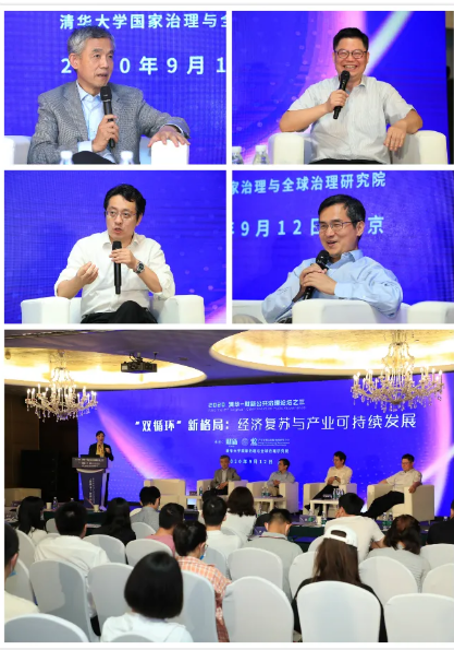
Panel Discussion in Session Two
